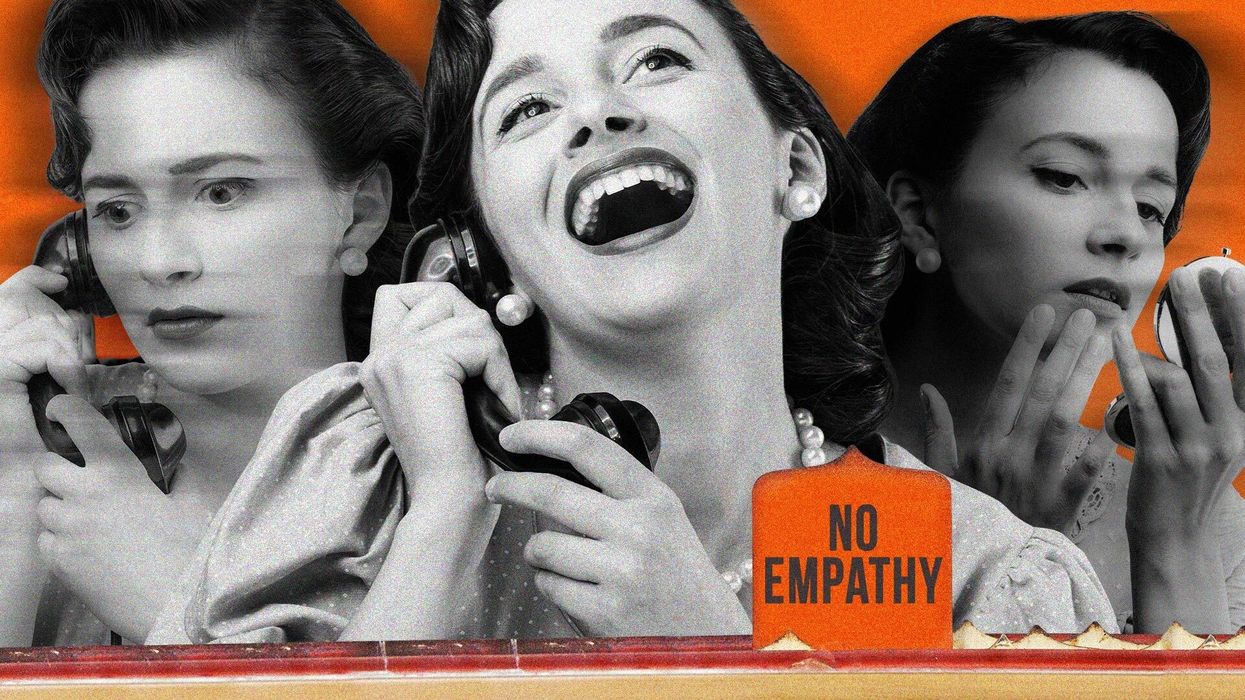Has Toxic Self-Care Sparked An Empathy Crisis?
How’s your bandwidth right now? How much space are you holding? Are you almost at capacity? We are breaking down the ways toxic self-care language and "therapy speak" has transformed modern friendships.

It’s a tale as old as time—girl meets boy, girl falls for boy, and girl talks to best friend on the phone for months ad nauseam about the anxious doldrums of a situationship. Said girl, we’ll call her Carrie, talked to her best friend Miranda on the phone for months about this tepid romance with a Massachusetts boy who was very boring, but also not very nice. Miranda was patient with the spiraling conversations about Mr. Boring–friends can be tedious, but being annoying isn’t a sin, right? One day, the tables turned and Miranda’s own boyfriend broke up with her. She texted Carrie, “Hey me and Steve just broke up and it’s been really painful. Can we talk on the phone?” Carrie replied: “You know I’ve been going through a lot with my own romantic life and I don’t have the bandwidth to take on any more right now. We can talk on the phone but I’d prefer if we didn’t talk about that.”
A friend relayed this story to me and once I was done cackling, I felt bad for Miranda. The comical unfairness is blatant, but what stuck with me was the negotiation. The idea that Carrie was willing to have a conversation if Miranda was willing to ignore the central crisis in her life. She offered to go through the overtures of friendship with none of the substance. In that moment, empathy was a currency that Carrie wasn’t willing to spend. It confused me so deeply that I’m still trying to untangle the tactlessness of that exchange months later. Was it the disingenuous formality? Denying permission to have emotions? Defining your capacity to give a shit? I tried to dress it up with a lot of analysis, but at the end of the day, I was just left with an eerie feeling. Put simply, it gave me the creeps.
For the record, I’m no Miss Congeniality. I love a hard boundary. I love Airplane Mode. I have enough unread texts, e-mails, and Instagram notifications to give a Virgo a heart attack. We’ve all negotiated dicey boundaries, heartbreaking friend breakups, and the long-con ghosting of that annoying person who only talks about themselves—but the above conversation is pointing to a much more sinister trend. I feel the need to emphasize that yes, self-care is good. Yes, boundaries are healthy. Yes, we all have an elastic emotional bandwidth that we need to protect–put your mask on before helping another passenger, blah blah blah–but the fact that I have to defensively explain these definitions is part of the issue. There has been a flattening of language that leaves conversations devoid of nuance. Self-care = good. Boundaries = good. Positive thinking = good. If for any reason you exceed the appropriate limit: Toxic. Toxic self-care. Toxic positivity. Toxic individualism.
The language itself is overplayed and hyperbolic, but there is a common thread in all these trends: Western individualism run amok. In America, self-care was divorced from its roots of avoiding burnout and mutated into rampant narcissism. My favorite spoof of this phenomenon is the Instagram account @power.of.self.care, mostly because when their posts pop up in my feed—like, “Always prioritize comfort over growth. Read that again.”—the aesthetic and language are almost indistinguishable from all the other sincere self-care messaging I see online. We all cringed at that “I am actually at my emotional capacity” meme template that made the rounds in 2019, satirizing the cut-and-paste ease with which you can dismiss a friend in an emotional crisis. America went ahead and did what it does best: took (largely Eastern) concepts of wellness and mindfulness and tried to shove it into the machine of capitalism. It used to be: “Take care of yourself so you can best care for your community. Fill your own cup before trying to fill others.” America’s rugged, pistol-swingin’ individualism made a drastic edit: Take care of yourself so you can best care for yourself. Fill your own cup, so your cup is always at its fullest. In short: everyone else’s needs are a constant threat to your own self-improvement.
This isn’t a bi-partisan issue. Yes, radical individualism is well-illustrated in the anti-masker protests. The idea that a slight inconvenience is not worth the health and safety of our society as a whole—any degree of discomfort is a violation of our freedom. But Carrie and Miranda are staunchly democratic, vaxxed-up, mask-wearing liberals. We liberals are all about compassion, and yet, the same callous individualism still pops up. When I was at my liberal arts college in Boston, a girl in my co-op made a spreadsheet for her social engagements. To be clear, this existed so her friends could make appointments to hang out with her. After marveling at the pompousness of said spreadsheet, it clued me in on a core idea: the commodification of our personal time.
At the center of all this toxic individualism, toxic self-care, and toxic positivity is the same idea: Friendship is a reciprocal exchange of goods, you must optimize the time to fulfill your greatest potential, and anything that isn’t directly related to your personal journey is a waste of time. It has evolved into a brutal formalization of conversations. I grant you permission to talk, with the understanding that every moment that goes by is a vampiric draining of my bandwidth. When I am at capacity, I will ask permission to waste someone else’s precious energy. When did it become implicit that friendships are about merely tolerating another person while they talk about themselves? Call me old-fashioned, but I love my friends. Their thoughts and feelings are exciting to me. When they are in pain, I don’t hesitate to help. Yes, sometimes it’s at an inconvenient time, but we figure it out. Talking to them doesn’t feel like passing a conversational baton—when you have the talking stick, you get to monologue about yourself.
Spreadsheets, bandwidths, and bad conversationalists aside—we’ve miscast the enemy. The enemy is not your friends and their outrageous desire to connect on an emotional level. There is a reason time feels like a precious commodity, because it is. Most millennials and Gen-Zers have a bleak economic future. We are overworked, underpaid, and likely never going to own property. The idea of “self” may feel like it only exists in that precious window of time outside of work, so it’s only fair that this vigilant defense of our time and energy occurs in those hours. It’s no wonder we’re always trying to abbreviate and templatize modes of connection—we’re fucking exhausted. So what should we do about it? Protect your energy, but try not to “kick the cat” (ie. taking out your frustrations to an innocent bystander). Don’t treat your friendships with the same mechanical, soulless “grindset" that has been thrust upon you by living in America. Don’t try to “optimize” your relationships—lower output and greater return on investment year over year—it doesn’t work like that. Friendships are not a joyless exchange of labor. Empathy is not a limited resource. I am aware this is starting to feel soapbox-y; the second I bring up capitalism, I can already hear my uncle calling me a “communist lesbian.” But hey, it is what it is. We’re all a mirror of the society we live in.Want more stories like this?
Is Monogamy So Out It's Kinky?
Is Marital Hate Really "Normal"?
The Language of Disgust: From Cringe to Ick




